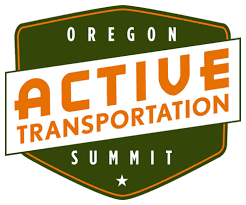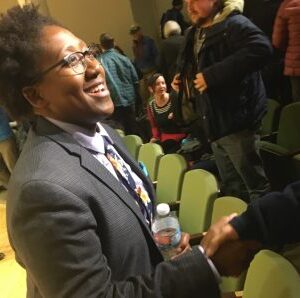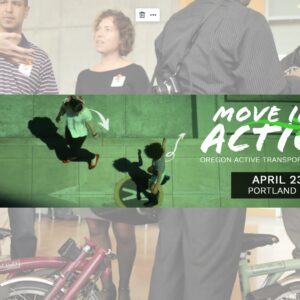The Oregon Active Transportation Summit moves to a new venue this year. The Street Trust’s annual gathering of planning professionals, agency staffersm thinkers and activists takes place at the Oregon Convention Center. The three-day event will have an explicit focus on climate action and transportation justice and will be headlined by Emma Marris, an environmental writer based in Klamath Falls.
As always, OATS will feature workshops, panels, and roundtable discussions aimed at sharpening your transportation planning and advocacy toolkit.
Tamika Butler from Toole Design Group will kick off the summit on Tuesday with a transportation equity and justice workshop.
Marris, who will deliver the keynote address on Wednesday morning (3/18), is known for her work as an environmental scientist, activist and journalist. Her recent article in the New York Times about how to grapple with climate grief was shared in our Monday Roundup back in January and her TED Talk, “Nature is Everywhere: We just need to learn to see it” has been viewed over 1 million times.
Wednesday’s lunchtime discussion will be led by young climate activists who will, “share their ideas and expectations for how we can act now to save the world they will inherit.”
Advertisement
Other panels and workshops that caught my eye include: The road to jurisdictional transfers: history and evolution of highways in Oregon; Building Mobility: Imagining Active Transportation’s Impact on Buildings; ODOT’s Blueprint for Urban Design; Earthquakes, Human-Powered Mobility, and Community Resilience; Historic Columbia River Highway State Trail – Filling in the trail, one tunnel at a time; and Car-Free Streets
Another part of the summit that you won’t want to miss is the happy hour. Enjoy fine beverages (no-host bar) and Lightning Slide presentations organized by Young Professionals in Transportation from 5:30 to 8:30 pm at Sprit of ’77 on NE Martin Luther King Jr. Blvd.
The summit ends on Thursday (3/19) with a tactical urbanism workshop where participants will learn why this is such a great way to re-imagine communities and how to design your own pop-up project.
Registration for OATS is $225. Check out TheStreetTrust.org for more information.
— Jonathan Maus: (503) 706-8804, @jonathan_maus on Twitter and jonathan@bikeportland.org
— Get our headlines delivered to your inbox.
— Support this independent community media outlet with a one-time contribution or monthly subscription.








Thanks for reading.
BikePortland has served this community with independent community journalism since 2005. We rely on subscriptions from readers like you to survive. Your financial support is vital in keeping this valuable resource alive and well.
Please subscribe today to strengthen and expand our work.
Allen Alley, former GOP candidate for governor, has recently put up FB posts on electric vehicles. Alley is both a wonk and a CEO of a big company. Transportation will be getting cleaner. Even if we still rely on internal combustion engines, these will have to become more fuel efficient to compete with electric or hydrogen vehicles.
However, Oregon will probably not meet any ‘climate goals’ anyway—and it is not just because we are a big state in landmass–but it is due to the fact that lots of people are moving here. Both residences and workspaces take a lot of energy, especially in big buildings which are climate controlled around the clock and for most of the year. PGE has opened 2 new gas fired plants in the Clatskanie area, and stated back in 2007 that electric demand was increasing 2 percent a year, undoubtedly at a faster rate now. PGE now acquire 60 percent of its output from fossil fuels. And then, there is the direct use of natural gas in heating. And in other areas of the country natural gas plays a major role in air conditioning, too, from gas fired electric generation.
The production of concrete, alone, the typical material in urban construction, accounts for 8 percent of GHG gases. So, no, we won’t reach climate goals.